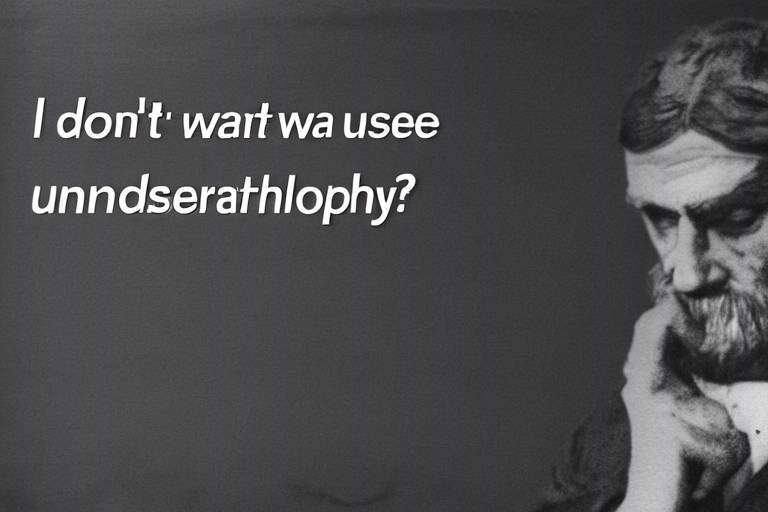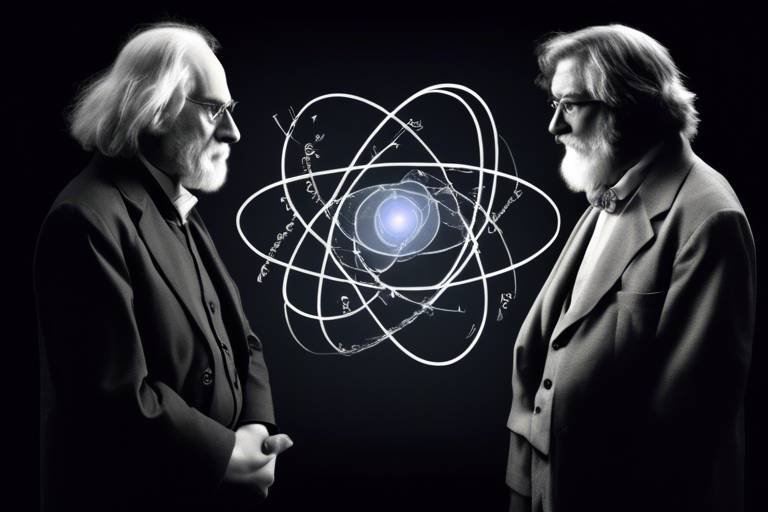Immanuel Kant vs David Hume - A Comparative Analysis
This article explores the philosophical contributions of Immanuel Kant and David Hume, focusing on their differing views on knowledge, experience, morality, and metaphysics, ultimately highlighting their impact on modern philosophy. The clash between Kant's rationalism and Hume's empiricism presents a fascinating narrative that continues to resonate within philosophical discussions today. By delving into their distinct epistemologies, ethical frameworks, and metaphysical inquiries, we can better appreciate how these thinkers have shaped our understanding of knowledge and morality.
Kant's theory of knowledge emphasizes the role of the mind in shaping experience, proposing that our understanding of the world is a synthesis of sensory data and innate concepts. This perspective challenges the empiricist views held by philosophers like Hume, who argue that knowledge arises solely from experience. Kant believed that while our experiences are indeed rooted in sensory input, it is the mind's innate structures that organize and interpret these experiences, thus creating knowledge. In essence, he posited that we do not merely passively receive information; we actively construct our understanding of reality through a combination of external stimuli and internal faculties.
In stark contrast, Hume argues that knowledge arises solely from sensory experience. He asserts that human understanding is limited to what can be observed, leading to a profound skepticism about causation and the self. For Hume, any claim to knowledge that extends beyond immediate experience is suspect. He famously questioned the principle of causation, suggesting that our belief in cause-and-effect relationships is not derived from rational deduction but rather from habit and custom. This radical skepticism forces us to reconsider the foundations of scientific inquiry and the very nature of human understanding.
Kant introduces the concept of synthetic a priori judgments as foundational to knowledge. He suggests that certain truths exist independently of experience yet are necessary for understanding the empirical world. For example, mathematical truths like "2 + 2 4" are not derived from sensory experience but are universally applicable and necessary for logical reasoning. Kant argues that without these innate concepts, our ability to make sense of the world would be severely compromised. This notion of synthetic a priori knowledge is crucial in bridging the gap between pure reason and empirical observation.
Examples such as mathematical truths and principles of causality illustrate Kant's argument, demonstrating how these concepts are essential for making sense of our experiences. These judgments are not merely analytical (true by definition) but expand our knowledge by connecting concepts that are not inherently linked. For instance, the statement "Every event has a cause" is not something we can observe directly; rather, it is a necessary presupposition that allows us to interpret our experiences meaningfully.
Critics challenge Kant's concept, questioning the existence of synthetic a priori knowledge and arguing that all knowledge is ultimately derived from empirical experience. They contend that Kant's reliance on innate concepts is problematic, as it raises questions about the origin of these concepts and their applicability in a diverse range of experiences. This ongoing debate highlights the tension between rationalist and empiricist philosophies, inviting further exploration into the nature of knowledge itself.
Hume's skepticism about induction raises questions about the justification of causal inferences. He posits that past experiences cannot guarantee future occurrences, thus challenging the certainty of scientific knowledge. This leads to the famous problem of induction, which questions how we can justify our beliefs about unobserved phenomena based on observed instances. For example, just because the sun has risen every day in the past does not guarantee that it will rise tomorrow. This radical questioning of the basis of knowledge compels us to reconsider our epistemological foundations.
Kant and Hume present contrasting views on morality, with Kant advocating for a deontological approach based on duty and reason, while Hume emphasizes emotions and social utility as the basis for moral judgments. Kant's moral philosophy is rooted in the belief that reason dictates our moral obligations. He argues that actions should be guided by principles that can be universally applied, asserting that moral laws are not contingent upon personal feelings or societal norms.
Kant's categorical imperative serves as a universal moral law, emphasizing rationality and autonomy in ethical decision-making. He posits that we should act only according to that maxim which we can will to become a universal law. This principle underscores the importance of duty and moral responsibility, suggesting that true morality transcends individual desires and is grounded in rational thought.
On the other hand, Hume's sentimentalism posits that moral judgments stem from human emotions and sentiments. He suggests that empathy and social considerations play a crucial role in determining what is right or wrong. According to Hume, our moral evaluations are deeply rooted in our feelings and the impact of our actions on others, thus highlighting the importance of social context in ethical considerations.
The philosophical legacies of Kant and Hume continue to influence contemporary thought, shaping debates in epistemology, ethics, and metaphysics. Their contrasting views invite ongoing discussions about the nature of knowledge and morality. Kant's emphasis on reason and universality has laid the groundwork for modern ethical theories, while Hume's insights into human psychology and emotion have enriched our understanding of moral philosophy. As we navigate the complexities of modern life, the ideas of these two monumental thinkers remain as relevant today as they were in their time.
- What are the main differences between Kant and Hume?
Kant emphasizes the role of reason and innate concepts in knowledge, while Hume focuses on sensory experience and skepticism regarding causation. - How did Kant influence modern philosophy?
Kant's ideas laid the foundation for deontological ethics and have influenced various fields, including metaphysics and epistemology. - What is Hume's problem of induction?
Hume's problem of induction questions the justification of causal inferences based on past experiences, highlighting the limits of empirical knowledge.

Kant's Epistemology
Immanuel Kant's approach to epistemology is nothing short of revolutionary. He boldly challenged the prevailing empiricist views of his time, which held that knowledge is primarily derived from sensory experiences. Instead, Kant proposed that our understanding of the world is a complex interplay between our sensory experiences and the innate concepts that our minds bring to the table. In other words, while we gather information through our senses, it is our mind that organizes and interprets this information, shaping our experience of reality. This idea is akin to a painter who, while using the same colors, creates vastly different artworks based on their unique vision and technique.
Kant introduced the concept of the "transcendental" in his work, suggesting that certain elements of our understanding are inherent to the human mind. He believed that these elements are not derived from experience but are instead prerequisites for making sense of any experience. This leads to his famous assertion that knowledge is not merely a passive reception of data, but an active process of synthesis. For Kant, the mind plays a crucial role, acting as a filter that structures our perceptions into coherent experiences. Without this mental framework, our sensory data would be chaotic and unintelligible.
To illustrate Kant's epistemological stance, consider the following key elements:
- Phenomena vs. Noumena: Kant distinguished between what we can perceive (phenomena) and things as they are in themselves (noumena). He argued that while we can know the former, the latter remains inaccessible to human understanding.
- Categories of Understanding: Kant proposed that our mind is equipped with innate categories—such as causality, unity, and plurality—that help us organize sensory data into meaningful experiences.
- Synthetic A Priori Knowledge: He introduced the notion of synthetic a priori judgments, which are truths that are universally valid and necessary for understanding our empirical experiences, despite not being derived from them.
Through these concepts, Kant laid the groundwork for a new understanding of knowledge that transcended the limitations of empiricism. His ideas prompted a re-evaluation of how we perceive reality and the role of the observer in the process of understanding. This shift was not just a minor tweak in philosophical thought; it was a profound transformation that influenced not only philosophy but also the emerging fields of psychology and cognitive science.
In summary, Kant's epistemology emphasizes the active role of the mind in shaping our experiences and understanding of the world. By asserting that knowledge is a synthesis of sensory input and innate concepts, he challenged the notion that we are mere passive recipients of information. Instead, he positioned the mind as a vital participant in the process of knowledge acquisition, forever altering the landscape of modern philosophy.

Hume's Empiricism
David Hume, a prominent figure in the realm of philosophy, is best known for his radical approach to understanding knowledge through empiricism. Unlike his predecessors who often relied on rationalism, Hume firmly believed that all knowledge is rooted in sensory experience. He argued that our understanding of the world is built upon what we can observe, hear, see, and touch. This perspective leads to a profound skepticism about concepts that extend beyond direct experience, such as causation and the self. Hume's assertion that human understanding is limited to empirical observations challenges the very foundation of how we perceive reality.
At the heart of Hume's empiricism lies the idea that our minds are not equipped to grasp abstract concepts or truths that cannot be directly experienced. For instance, when we think about causation, we often assume a direct link between events. However, Hume posits that we cannot observe causation itself; we only see one event following another. This leads to a crucial question: if we cannot directly observe causation, how can we be certain it exists? Hume's skepticism about causation forces us to reconsider the certainty with which we approach scientific knowledge and our everyday understanding of the world.
Hume's perspective can be summarized in a few key points:
- Knowledge is Limited: Hume argues that our knowledge is confined to what we can directly experience. Anything beyond that is speculative.
- Skepticism about Causation: He challenges the notion of cause and effect, suggesting that past experiences do not guarantee future outcomes.
- Critique of the Self: Hume questions the existence of a permanent self, suggesting that what we consider 'self' is merely a collection of perceptions.
Hume's empiricism invites us to reflect on the nature of our beliefs and the sources from which they arise. By emphasizing sensory experience, he encourages a more scientific approach to knowledge—one that values observation and evidence over speculation. This approach has profound implications not just for philosophy, but for the development of the scientific method itself, which relies heavily on empirical data.
Furthermore, Hume's ideas pave the way for modern skepticism, influencing later philosophers and scientists to question the validity of assumptions that cannot be empirically verified. His work serves as a reminder that while we may strive for certainty, much of our understanding is inherently uncertain and subject to revision based on new experiences.
In conclusion, Hume's empiricism is a cornerstone of modern philosophical thought, challenging us to reconsider our assumptions about knowledge, causation, and the self. His emphasis on sensory experience has not only shaped the course of philosophy but has also laid the groundwork for a more empirical approach to understanding the world around us.

Kant's Synthetic A Priori Judgments
Immanuel Kant's concept of synthetic a priori judgments is a cornerstone of his epistemology, which fundamentally reshapes our understanding of knowledge. Unlike analytic judgments, which are true by virtue of their meanings alone (like "all bachelors are unmarried"), synthetic a priori judgments are those that extend our knowledge without relying solely on experience. They are crucial because they provide knowledge that is both informative and necessary, yet not derived from empirical observation. For instance, when we say, "7 + 5 12," we are not merely unpacking the definition of numbers; we are making a statement that is universally true, yet it requires an understanding of mathematical concepts that exist independently of any particular experience.
Kant argues that these judgments are essential for making sense of the world around us. They allow us to synthesize our sensory experiences with pre-existing concepts, enabling us to form coherent understandings of reality. This synthesis is what makes human cognition possible. Without these innate concepts, our experiences would remain chaotic and unstructured, much like trying to piece together a puzzle without knowing what the final picture looks like. Kant believed that certain fundamental truths—like the principles of causality and space—are not just learned through experience, but are necessary frameworks that shape our understanding of the empirical world.
To illustrate, consider the following examples of synthetic a priori knowledge:
- Mathematical truths: Statements like "the sum of the angles in a triangle equals 180 degrees" are universally valid and can be understood without direct experience of every triangle.
- Principles of causality: The idea that every effect has a cause is not something we observe in every instance, yet it is a necessary assumption that underpins scientific inquiry.
However, Kant's theory is not without its critics. Detractors argue that the existence of synthetic a priori knowledge is questionable, asserting that all knowledge ultimately stems from empirical experience. They contend that what Kant labels as 'a priori' could just be the result of repeated empirical observations that solidify into accepted truths. This debate raises significant questions about the nature of knowledge itself and whether we can ever truly separate our understanding from our experiences.
In essence, Kant's synthetic a priori judgments challenge us to rethink the relationship between our minds and the world. They assert that while our senses provide the raw data of experience, it is our innate cognitive structures that allow us to make sense of that data. This revolutionary idea not only reshaped philosophy but also laid the groundwork for modern discussions in epistemology and metaphysics, inviting us to explore the profound implications of how we acquire knowledge.

Examples of Synthetic A Priori Knowledge
When we delve into the concept of synthetic a priori knowledge, we encounter intriguing examples that illuminate how certain truths can exist independently of experience yet remain essential for our understanding of the world. One of the most prominent examples is found in mathematics. Consider the statement "7 + 5 12." This equation is not derived from sensory experience; instead, it is true by virtue of the definitions and relationships we establish within the realm of mathematics. We do not need to physically count objects to know that this addition holds true; it is an inherent truth, accessible through reason alone.
Another compelling illustration is the principle of causality. Kant argues that we cannot observe causation directly; rather, we infer it through our experiences. For instance, when we see a ball rolling and then striking a stationary object, we assume the ball's motion caused the object to move. This understanding of cause and effect is not something we can empirically verify in isolation, yet it is a fundamental concept that underpins our scientific inquiries and everyday reasoning. Without such synthetic a priori knowledge, our ability to navigate and interpret the world would be severely limited.
Moreover, consider the concept of space and time. Kant posits that our understanding of spatial relationships and temporal sequences is not merely a reflection of sensory data but rather a framework that our minds use to organize experiences. We intuitively grasp that two objects cannot occupy the same space at the same time, a principle that guides our navigation through the physical world. This understanding is not derived from experience but is instead a prerequisite for experiencing anything at all.
To summarize, synthetic a priori knowledge bridges the gap between our sensory experiences and the inherent structures of understanding that shape our perception of reality. Here are a few key examples:
- Mathematical truths - such as arithmetic and geometric principles.
- Principles of causality - understanding that events are linked through cause and effect.
- Concepts of space and time - the frameworks that allow us to make sense of our experiences.
These examples not only highlight Kant's revolutionary ideas but also challenge us to consider how much of our knowledge is constructed by the mind rather than solely derived from experience. This ongoing dialogue continues to shape philosophical discussions and invites further exploration into the nature of knowledge itself.
- What is synthetic a priori knowledge? - It refers to knowledge that is universally valid and necessary, yet not derived from experience.
- How does Kant differentiate between synthetic a priori and analytic a priori? - Analytic a priori knowledge is true by definition, while synthetic a priori knowledge requires both experience and innate concepts.
- Why is synthetic a priori knowledge important? - It forms the foundation for many scientific and mathematical principles that guide our understanding of the world.

Critiques of Synthetic A Priori
The concept of synthetic a priori judgments, introduced by Kant, has sparked significant debate among philosophers and scholars. Critics argue that Kant's assertion of knowledge existing independently of experience is problematic. One key critique is the question of whether such knowledge can genuinely exist. How can we claim to know something that is not derived from our experiences? This skepticism leads to a deeper inquiry into the foundations of knowledge itself.
Some philosophers, particularly empiricists, argue that all knowledge is fundamentally rooted in sensory experience. They contend that Kant's synthetic a priori judgments are not truly independent of experience but rather are constructed from it. In their view, concepts like mathematical truths or principles of causality arise from repeated experiences rather than existing in a realm of pure reason. This perspective challenges the very essence of what Kant proposes: that certain truths can be known without empirical evidence.
Moreover, critics have pointed out that Kant's reliance on synthetic a priori judgments can lead to a form of intellectual elitism. If we assert that some knowledge is accessible only through innate concepts, we risk alienating those who may not possess the same cognitive frameworks. This raises a crucial question: Is it fair to claim that some truths are universally valid while dismissing the experiential knowledge of others?
Additionally, some contemporary philosophers have argued that the distinction between analytic and synthetic propositions is not as clear-cut as Kant suggested. They propose that many statements we consider synthetic might actually be analytic upon closer examination. For instance, statements about mathematical truths could be seen as tautological rather than genuinely synthetic. This blurring of lines complicates Kant's framework and invites further scrutiny of his claims.
In conclusion, while Kant's idea of synthetic a priori judgments has undeniably shaped modern philosophy, it is essential to engage with the critiques surrounding it. The ongoing dialogue about the nature of knowledge and the role of experience is vital for a comprehensive understanding of epistemology. As we explore these critiques, we must consider the implications they hold for our understanding of reality and the limitations of human cognition.
- What are synthetic a priori judgments? Synthetic a priori judgments are propositions that are universally true and necessary, yet not based on empirical experience. Kant believed they are essential for understanding the world.
- Why do critics challenge Kant's view? Critics argue that all knowledge is derived from experience, questioning the existence of knowledge independent of sensory input.
- How does this debate impact modern philosophy? The discussion around synthetic a priori judgments influences contemporary debates in epistemology, ethics, and metaphysics, shaping our understanding of knowledge and morality.

Hume's Problem of Induction
This article explores the philosophical contributions of Immanuel Kant and David Hume, focusing on their differing views on knowledge, experience, morality, and metaphysics, ultimately highlighting their impact on modern philosophy.
Kant's theory of knowledge emphasizes the role of the mind in shaping experience, proposing that our understanding of the world is a synthesis of sensory data and innate concepts, challenging empiricist views.
Hume argues that knowledge arises solely from sensory experience, asserting that human understanding is limited to what can be observed, leading to skepticism about causation and the self.
Kant introduces synthetic a priori judgments as foundational to knowledge, suggesting that certain truths exist independently of experience yet are necessary for understanding the empirical world.
Examples such as mathematical truths and principles of causality illustrate Kant's argument, demonstrating how these concepts are essential for making sense of our experiences.
Critics challenge Kant's concept, questioning the existence of synthetic a priori knowledge and arguing that all knowledge is ultimately derived from empirical experience.
Hume's skepticism about induction raises profound questions about the justification of causal inferences. He famously argued that past experiences cannot guarantee future occurrences, leading to a significant challenge in the realm of scientific knowledge. Imagine you're on a train that has always reached its destination on time. You might think, "This train will always be on time." But Hume would remind you that just because something has happened consistently in the past doesn't mean it will happen in the future. This line of thinking exposes a critical flaw in our understanding of causation and the limits of our knowledge.
In essence, Hume's problem of induction can be summarized in a few key points:
- Inductive Reasoning: Hume argues that we often rely on inductive reasoning, which is the process of drawing general conclusions from specific observations.
- Limitations of Experience: He emphasizes that our experiences are limited and cannot provide a solid foundation for predicting future events.
- Skepticism of Causation: This leads to skepticism about the concept of causation itself, as we cannot observe causal connections directly.
This skepticism has profound implications for science and philosophy, as it challenges the very basis of empirical knowledge. If we cannot trust that the future will resemble the past, how can we establish scientific laws or principles? Hume's inquiry invites us to reconsider the reliability of our assumptions, urging a more cautious approach to claims of knowledge derived from experience.
Kant and Hume present contrasting views on morality, with Kant advocating for a deontological approach based on duty and reason, while Hume emphasizes emotions and social utility as the basis for moral judgments.
Kant's categorical imperative serves as a universal moral law, asserting that actions should be guided by principles that can be universally applied, emphasizing rationality and autonomy in ethical decision-making.
Hume's sentimentalism posits that moral judgments stem from human emotions and sentiments, suggesting that empathy and social considerations play a crucial role in determining what is right or wrong.
The philosophical legacies of Kant and Hume continue to influence contemporary thought, shaping debates in epistemology, ethics, and metaphysics, and inviting ongoing discussions about the nature of knowledge and morality.
- What is the main difference between Kant and Hume's views on knowledge?
Kant believed that knowledge is shaped by both sensory experience and innate concepts, while Hume argued that knowledge arises solely from sensory experience. - How does Hume's problem of induction affect scientific inquiry?
Hume's problem of induction suggests that we cannot assume that past experiences will predict future events, raising skepticism about the certainty of scientific laws. - What are Kant's and Hume's views on morality?
Kant emphasized a rational approach to morality based on duty, while Hume focused on emotions and social utility as the basis for moral judgments.

The Nature of Morality
The exploration of morality is a fascinating journey through the minds of two of philosophy's greatest thinkers: Immanuel Kant and David Hume. Their contrasting views illuminate the very essence of what it means to be moral. While Kant's approach is deeply rooted in deontological ethics, which emphasizes duty and rationality, Hume's perspective is more aligned with sentimentalism, suggesting that our emotions and social interactions shape our moral judgments. This divergence raises an essential question: Are our moral decisions guided by reason, or are they the product of our feelings and societal influences?
Kant believes that morality is grounded in universal principles that can be applied to all rational beings. He introduces the concept of the categorical imperative, a moral law that demands we act according to maxims that can be universalized. In simpler terms, Kant argues that before we take action, we should consider whether the principle behind our action could be adopted by everyone without contradiction. This idea emphasizes the importance of rationality and autonomy in ethical decision-making, suggesting that moral actions are not just about outcomes but about adhering to a moral framework that respects the dignity of all individuals.
On the flip side, Hume challenges this rationalistic view by positing that our moral judgments are primarily influenced by our emotions and sentiments. According to Hume, morality is not a matter of strict rationality but is instead rooted in human feelings. For him, our ability to empathize with others plays a crucial role in determining what we consider right or wrong. This emotional underpinning leads to a more flexible understanding of morality, one that adapts to the complexities of human relationships and social contexts. To Hume, moral decisions arise from our instinctual responses to situations rather than abstract principles.
To illustrate the contrast between Kant's and Hume's views, consider the following table:
| Aspect | Kant's View | Hume's View |
|---|---|---|
| Foundation of Morality | Universal principles and duty | Emotions and sentiments |
| Type of Ethics | Deontological | Sentimentalism |
| Decision Making | Rationality and universalizability | Empathy and social considerations |
| Moral Law | Categorical Imperative | Subjective and variable |
This table succinctly captures the essence of their differing philosophies. Kant's rigid structure contrasts sharply with Hume's fluidity, prompting us to reflect on our own moral frameworks. Are we more inclined to follow strict rules, or do we allow our feelings to guide our decisions? This tension between duty and sentiment is not just academic; it resonates in our everyday lives as we navigate complex moral landscapes.
Ultimately, the debate between Kant and Hume offers profound insights into the nature of morality. It challenges us to think critically about where we derive our moral beliefs and how we justify our actions. As we grapple with these questions, we find that the interplay between reason and emotion is a dynamic and ongoing conversation in the realm of ethics.
- What is Kant's categorical imperative?
Kant's categorical imperative is a foundational principle in his moral philosophy, which states that one should act only according to that maxim which one can will to become a universal law. - How does Hume view morality?
Hume believes that morality is rooted in human emotions and sentiments, suggesting that our moral judgments are influenced by our feelings rather than strict rational principles. - Can both Kant's and Hume's views coexist?
While they present contrasting perspectives, many modern philosophers argue that elements of both rationality and emotion play crucial roles in moral decision-making.

Kant's Categorical Imperative
Immanuel Kant's categorical imperative is a cornerstone of his moral philosophy, representing a universal principle that serves as a guide for ethical behavior. Unlike hypothetical imperatives, which are conditional and depend on personal desires (like saying, "If you want to be healthy, you should exercise"), the categorical imperative is unconditional. It demands adherence regardless of individual goals or outcomes. This concept can be summarized in a few key formulations, each emphasizing the importance of rationality and universality in moral decision-making.
One of the most notable formulations of the categorical imperative is the principle of universalizability. Kant argues that when we act, we should consider whether our actions could be willed as a universal law applicable to everyone. For instance, if one were to lie to get out of trouble, they must ask themselves: "What if everyone lied in similar circumstances?" If the answer leads to a contradiction or an undesirable world, then the action is deemed immoral. This principle not only fosters consistency in moral reasoning but also respects the autonomy of all rational beings.
Another significant aspect of the categorical imperative is its emphasis on human dignity. Kant asserts that we must treat humanity, whether in ourselves or others, as an end in itself and never merely as a means to an end. This idea reinforces the notion that every individual possesses intrinsic worth and should not be exploited for personal gain. For instance, using someone solely for financial benefit disregards their inherent value as a person. Kant's perspective invites us to consider the broader implications of our actions on the dignity of others.
To illustrate these principles, let’s consider a practical example. Imagine a situation where you find a wallet on the street. The categorical imperative would guide you to reflect on the action of keeping the wallet for yourself. You would ask: "Could I will that everyone who finds a wallet keeps it?" The answer is likely no, as it would lead to a society where people cannot trust one another, undermining social order. Therefore, returning the wallet aligns with the moral law that Kant proposes.
However, Kant's categorical imperative is not without its critiques. Some argue that its rigid structure can lead to moral dilemmas where conflicting duties arise. For example, if lying is deemed wrong, what happens when telling the truth could harm someone? Critics suggest that a more flexible approach might be necessary to navigate complex ethical situations. Nevertheless, Kant's contribution remains vital in discussions about morality, as it challenges us to think deeply about the principles guiding our actions.
In summary, Kant's categorical imperative provides a robust framework for understanding morality that emphasizes rationality, universality, and respect for human dignity. By encouraging individuals to consider the broader implications of their actions, Kant invites us to engage in a more thoughtful and principled approach to ethical decision-making.
- What is the categorical imperative? The categorical imperative is a foundational principle in Kant's moral philosophy that dictates actions should be universally applicable and respect the inherent dignity of all individuals.
- How does the categorical imperative differ from hypothetical imperatives? Unlike hypothetical imperatives, which depend on personal desires, the categorical imperative is unconditional and applies universally, regardless of individual goals.
- Can the categorical imperative lead to moral dilemmas? Yes, some critics argue that its rigid structure can create conflicts between duties, leading to challenging ethical situations.
- Why is the categorical imperative important in modern philosophy? It encourages a principled approach to ethics, focusing on rationality and the treatment of individuals with dignity, influencing contemporary discussions on morality.

Hume's Sentimentalism
David Hume's approach to morality, often referred to as sentimentalism, presents a fascinating perspective that diverges significantly from the rationalist views of his contemporaries. At the heart of Hume's philosophy is the idea that our moral judgments are not derived from reason alone; rather, they are deeply rooted in human emotions and sentiments. Imagine walking through a bustling marketplace, where the joy of seeing a friend or the sorrow of witnessing someone in distress stirs feelings within you. This emotional response is, according to Hume, the very foundation of our moral compass.
Hume argues that morality is inherently social and that our feelings towards others—whether they be empathy, compassion, or even indignation—play a crucial role in shaping our ethical beliefs. He asserts that when we witness acts of kindness or cruelty, our emotional reactions guide our judgments about what is right or wrong. In this sense, morality is not a cold, detached calculation but rather a warm, human response to the world around us. This perspective challenges the notion that moral truths exist independently of human experience, suggesting instead that they are contingent upon our social interactions and emotional lives.
To illustrate his point, Hume famously stated, "Reason is, and ought only to be the slave of the passions." This quote encapsulates his belief that while reason can help us navigate moral dilemmas, it is ultimately our emotions that drive our moral decisions. It's as if reason is the ship's navigator, but the winds of sentiment propel it forward. This leads to a more dynamic understanding of morality, one that acknowledges the complexity of human emotions and the role they play in shaping our ethical frameworks.
Furthermore, Hume's sentimentalism emphasizes the importance of sympathy—the ability to resonate with the feelings of others. He posits that our capacity for sympathy allows us to connect with the experiences of those around us, fostering a sense of community and shared moral understanding. This connection is pivotal; it encourages us to consider the impact of our actions on others and to cultivate a moral landscape that prioritizes empathy and social welfare.
In contrast to Kant's deontological ethics, which relies on universal principles and duties, Hume's view is more fluid and adaptable. It recognizes that moral judgments can vary based on context and the emotional states of individuals involved. For example, what may be deemed morally acceptable in one culture could be viewed as reprehensible in another, reflecting the diverse emotional landscapes that shape our moral beliefs. This variability does not undermine the validity of moral judgments but rather enriches our understanding of morality as a complex interplay of emotions, culture, and social dynamics.
In summary, Hume's sentimentalism invites us to embrace the emotional aspects of morality, urging us to recognize that our ethical beliefs are not merely products of rational deliberation but are deeply intertwined with our feelings and social connections. This approach not only broadens our understanding of morality but also challenges us to cultivate empathy and compassion in our interactions with others, ultimately leading to a more humane and understanding society.
- What is Hume's sentimentalism? Hume's sentimentalism is the view that moral judgments arise from human emotions and sentiments rather than from reason alone.
- How does Hume's view differ from Kant's? Hume emphasizes emotions and social utility in moral judgments, while Kant focuses on duty and universal principles.
- What role does sympathy play in Hume's moral philosophy? Sympathy allows individuals to connect with the feelings of others, fostering a shared moral understanding and community.
- Can moral judgments vary between cultures according to Hume? Yes, Hume acknowledges that moral judgments can differ based on cultural contexts and emotional experiences.

Impact on Modern Philosophy
The philosophical legacies of Immanuel Kant and David Hume have profoundly shaped modern thought, influencing diverse fields such as epistemology, ethics, and metaphysics. Their contrasting perspectives on knowledge and morality continue to spark debates among philosophers, scholars, and students alike. Kant’s emphasis on the role of the mind in structuring knowledge invites us to consider how our innate concepts shape our understanding of the world, while Hume’s focus on empirical observation challenges us to scrutinize the foundations of our beliefs.
Kant's ideas have laid the groundwork for various philosophical movements, including German Idealism and Transcendentalism. His assertion that certain truths are inherent to human reason encourages a more structured approach to ethics, leading to frameworks that prioritize universal principles. This has influenced contemporary discussions on human rights and justice, as many modern ethical theories echo Kant's call for actions to be guided by maxims that could be universally applied.
On the other hand, Hume's skepticism about the limits of human understanding and his insistence on the importance of experience have paved the way for empiricist traditions. His ideas have been integral in the development of scientific methodology, as they encourage reliance on observable phenomena rather than abstract reasoning. This has led to a more pragmatic approach in various disciplines, including psychology and social sciences, where understanding human behavior is often grounded in empirical research.
Moreover, the tension between Kantian and Humean philosophies has given rise to rich dialogues in modern philosophy. For instance, the debate surrounding moral relativism versus moral absolutism can be traced back to their differing views on morality. While Kant’s categorical imperative suggests that moral truths are universal and unchanging, Hume’s sentimentalism implies that morality is subject to human feelings and societal norms. This ongoing discussion invites us to reflect on how we define right and wrong in a rapidly changing world.
In essence, the impact of Kant and Hume extends beyond their own time, as their ideas continue to resonate and challenge contemporary thinkers. The philosophical questions they raised about the nature of knowledge, the limits of human understanding, and the basis of moral judgments remain relevant today. As we navigate complex ethical dilemmas and seek to understand the world around us, the insights of Kant and Hume serve as invaluable resources, guiding us through the intricate landscape of modern philosophy.
- What is the main difference between Kant and Hume's views on knowledge?
Kant believed that knowledge is a synthesis of sensory experience and innate concepts, while Hume argued that knowledge is derived solely from sensory experience. - How did Kant influence modern ethics?
Kant’s categorical imperative has influenced contemporary discussions on universal moral principles and human rights, emphasizing the importance of rationality in ethical decision-making. - What role does Hume play in the development of empirical sciences?
Hume's skepticism about induction and emphasis on observation laid the groundwork for scientific methods that rely on empirical evidence rather than abstract reasoning. - Are Kant's and Hume's philosophies still relevant today?
Yes, their ideas continue to influence modern philosophical debates, particularly in epistemology and ethics, prompting ongoing discussions about the nature of knowledge and morality.
Frequently Asked Questions
- What is the main difference between Kant's and Hume's theories of knowledge?
Kant believes that our understanding of the world is shaped by both sensory data and innate concepts, proposing a synthesis of the two. In contrast, Hume argues that all knowledge comes solely from sensory experiences, leading to skepticism about concepts like causation.
- What are synthetic a priori judgments according to Kant?
Kant introduces synthetic a priori judgments as essential truths that exist independently of experience but are necessary for understanding our empirical world. These judgments, such as mathematical truths, help us make sense of our experiences.
- How does Hume's problem of induction challenge scientific knowledge?
Hume's problem of induction questions the justification of drawing causal inferences from past experiences. He argues that just because something has happened in the past, it doesn't guarantee it will happen in the future, which raises doubts about the certainty of scientific conclusions.
- What is Kant's categorical imperative?
Kant's categorical imperative is a universal moral law that suggests actions should be based on principles that can be applied universally. This emphasizes the importance of rationality and autonomy when making ethical decisions.
- How does Hume view the basis of morality?
Hume's perspective on morality is rooted in emotions and sentiments. He believes that moral judgments arise from human feelings and social considerations, indicating that empathy plays a vital role in determining right and wrong.
- What impact have Kant and Hume had on modern philosophy?
The legacies of Kant and Hume significantly influence contemporary debates in epistemology, ethics, and metaphysics. Their contrasting views invite ongoing discussions about the nature of knowledge and morality, shaping how we think today.



















